How Much Sleep Do Dogs Need Each Day?
Dogs and Sleep by Brian Morgan |Updated January 17, 2020
If you are a first-time dog owner, you might have noticed that your pooch sleeps when you retire to bed, snoozes away as you watch favorite evening show and curls up near you when you are sitting at a desk. It looks to you as though your dog goes off to slumberland all day in their dog bed, every day and does nothing else!
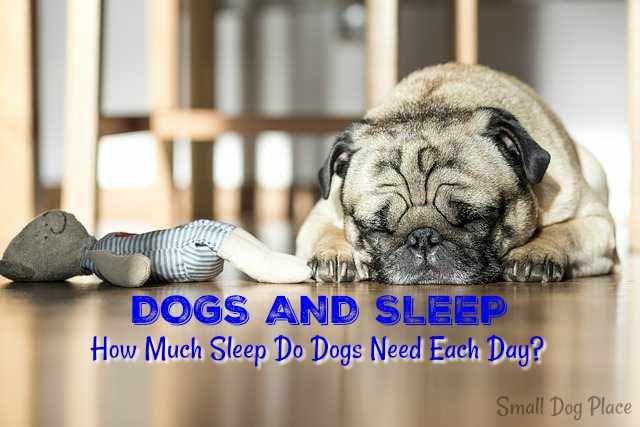 Dogs and Sleep: How Much Sleep Do Dogs Need each Day?
Dogs and Sleep: How Much Sleep Do Dogs Need each Day?Of course, it’s not the case with every dog, but just how much sleep do dogs need each day? Well, the amount of sleep your dog requires depends on some factors. We have put together a few of the elements that we think influence the amount of sleep your dog needs. So, read on to find out more.
The Science Behind Dogs and Sleep
Just why do dogs sleep much more than we do? Well, the answer is that your dog actually sleeps less intensely than you do, and therefore her quality of sleep is much less. Have you noticed that your dog will start barking at anything that sets foot at your door regardless of how long she has been asleep?
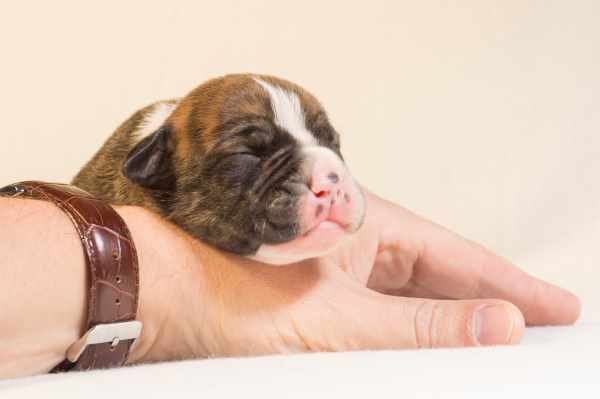 Dogs and Sleep: Puppies sleep far more than adult dogs.
Dogs and Sleep: Puppies sleep far more than adult dogs.While we spend about one-quarter of our sleep in rapid eye movement, your dog spends much less. Rapid eye movement is a type of deep sleep that is needed to rejuvenate energy lost because of our daily activities.
Also, you experience one long sleep cycle of more than 8 hours, while your dog’s pattern is interrupted and, as such, she needs to sleep more so that she can be as fully rested as you.
Other than your dog’s natural tendency to react to disturbances in her surrounding, her sleeping pattern is also influenced by the issues we have listed below.
Factors that Influence Sleep Patterns in Dogs
Age Can Have an Influence Over Dogs and Sleep
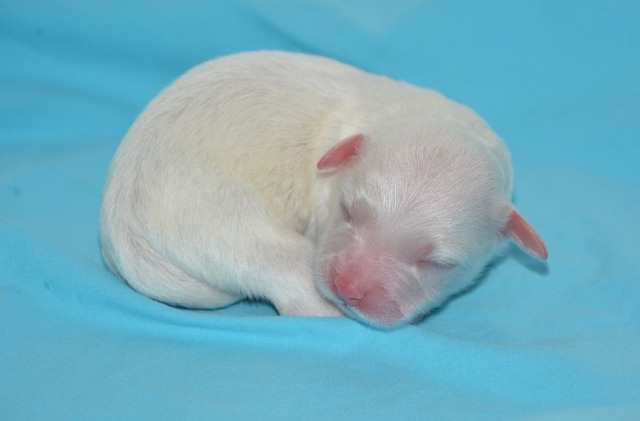 This is a Coton de Tulear neonate who will sleep most of the day and night.
This is a Coton de Tulear neonate who will sleep most of the day and night.The amount of sleep your dog needs varies over a 24-hour period, although on average it can be anything between 12 and 14 hours each day.
Senior dogs tend to sleep much more, although there are instances in between sleep when they need to empty their bladders. Puppies grab more rest than senior dogs, about 20 hours in most cases.
Puppies need more sleep because they grow really fast, and so they burn a lot of energy. As a result, they need to curl up somewhere and sleep it off. Rest is necessary because puppies play a lot and stay awake for far too long. If puppies do not get enough sleep, they experience stunted growth, and their behavior becomes erratic.
Dogs and Sleep
How Much Sleep Does My Dog Need Each Day
Puppies: About 20 Hours
Adults: 12 to 14 Hours
Seniors: Vary But may be more than an Adult Dog
Breed
If your pet is a working dog, she will tend to stay awake longer. Wakefulness is demanded by mental and physical necessities she is likely to come across each day.
If your pet has tasks that keep her active all day she will not find time to take a nap. However, she will need to make up for the time she has been active, and therefore, she will sleep longer when she is done with her daily duties to recover her energy.
Also, larger breeds do sleep a lot more compared to smaller breeds because they get tired quicker, so they need to rest for a while to restore body energy.
Health Can Impact Dogs and Sleep Patterns
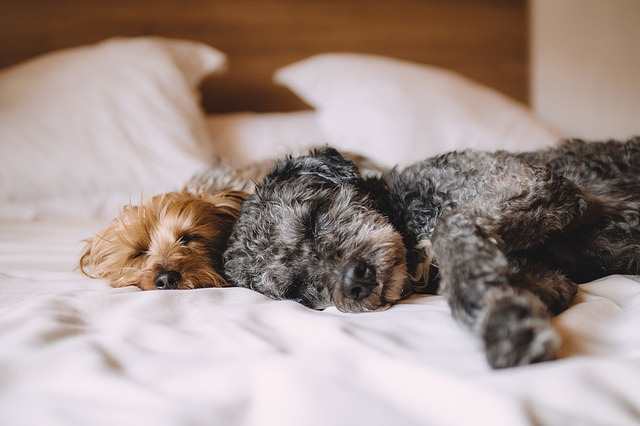 Breed differences may also influence the dog’s sleeping patterns.
Breed differences may also influence the dog’s sleeping patterns.Let’s face it, dogs sleep a lot, and this is basically their lifestyle so you should not get worried when your pet puts in long hours of sleep. If your pet sleeps for long hours, it is normal.
However, sometimes dogs show erratic sleep patterns or sometimes they don’t sleep at all. If this happens, you should be worried. Dogs that sleep all day and all night may be experiencing a health issue.
If you notice such behavior, it’s time to go and see your local vet. Unusual sleep patterns may be a sign that all is not well with your furry friend, and medical attention should be the next course of action.
Changes in the Environment
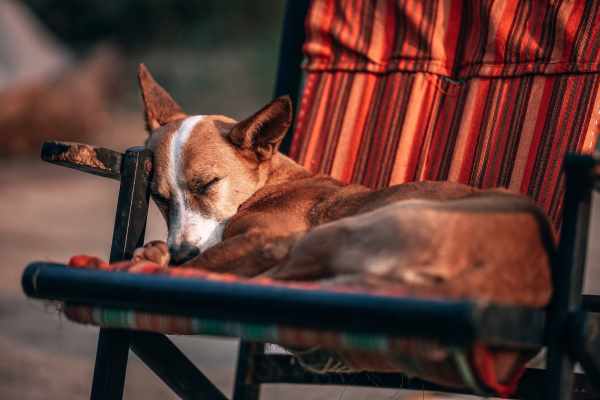 Dogs and Sleep: Changing Environment Conditions may affect the quantity and quality of sleep.
Dogs and Sleep: Changing Environment Conditions may affect the quantity and quality of sleep.Just like us, dogs go through some changes throughout their natural lives. They also react to these changes the same way we do, and that might include a change in their sleep cycle.
Your pet tends to adapt to her original environment, but if you change one or two things in her usual experience, she will get affected. If that happens, her sleep cycle changes, and she begins to take longer naps because she is stressed and is trying to come to terms with a change of conditions in her environment.
Boredom
Yes, dogs do get bored. If you do not keep your dog engaged, she will take long naps because she has nothing else interesting to do.
Unlike you, your dog does not have a Facebook page or TV channel to keep her occupied when she feels bored so she will nap instead.
This is the reason working breeds don’t sleep as much as other dogs. Working dogs have things to occupy them throughout the day.
The Diet Can Influence Dogs and Sleep Habits
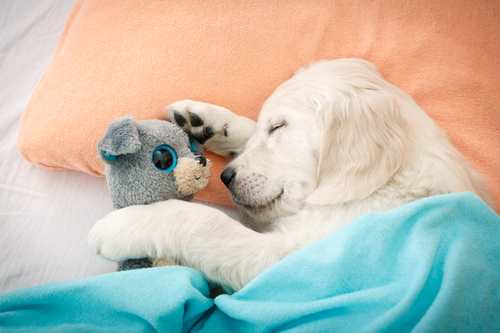
Your dog is very sensitive to changes in diet. Diet can impact your dog’s sleeping patterns because she gets her energy from the dog food she eats. If you feed her low-quality kibble like the type that comes with mostly filler, she will not get all the nutrients she needs.
Instead, she will spend time sleeping. If you tweak her food and introduce more nutrients, your dog will have more energy to play. If the food has lower nutrients, it means she needs a lot of time to digest which will cause her to slow down and sleep most of the time.
How Much Sleep is Too Much Sleep?
As a pet owner, you are probably wondering whether excessive sleeping means your dog is experiencing health issues. Although a lot of sleep is beneficial to your dog, a change in patterns such as sleeping more than normal or lethargy means something is not right.
Diabetes, hyperthyroidism and canine depression are all possible causes of lethargy, and your dog will sleep more than is normal for her under ordinary circumstances. Also, your dog may be suffering from any number of infections including distemper, rabies, parvovirus or Lyme disease.
Reach out to your vet if you see signs of abnormality in her sleeping pattern or if you feel that she is sleeping way too much so that you can rule out possible health conditions.
My Pooch isn’t Napping Enough
The flipside should worry you as well. You need to rush your pet to the vet immediately you notice that she is not sleeping well enough. Some factors can cause your dog to act restless and lose sleep.
Dogs and Sleep: Too Little Sleep
Issues that may cause sleeplessness include:
- Side effects of medication
- Hyperthyroidism
- Anxiety
- Allergies
- Chaotic home environment
It could also be that your pooch sleeps too much during the day that she finds it hard to sleep at night. If your dog sleeps a lot during the day, you can stimulate her through daily activities that keep her active like daycare or a toy.
Also, volunteerism works very well for most dogs. Exercise works wonders too. Take her out for a walk as you run errands because it is good for her health and it gives your dog a reason to be active.
How Can I Help My Pooch Get Quality Shut-Eye
Quality sleep is good for your dog. But just how do you help her get some sleep? She needs a lot of exercise during the day to keep her mind active and wear her out just before bedtime. If you engage your dog all day with toys and physical activities, she will not find the time to sit somewhere and nap off.
You need to feed her properly. The pet food industry can shock you if you don’t do your research thoroughly. Most pet foods claim to supply some types of nutrients when in the actual sense they contain filler material. If you feed your dog such foods, your dog will begin to lazy around because she does not have the energy to be active.
A regular checkup is important. Don’t ignore vet check-ups because they help you identify underlying issues. The abnormal sleep cycle is one such sign, and you should consult your vet as soon as possible.
Give her a nice, cozy place to sleep. Yes, just like you, dogs need a comfortable place to sleep. Most pet owners share their beds with pets, and in such a case, make sure that your bed has enough space to accommodate both of you. Although, it is best to have to get your dog their own dog bed to call their own.
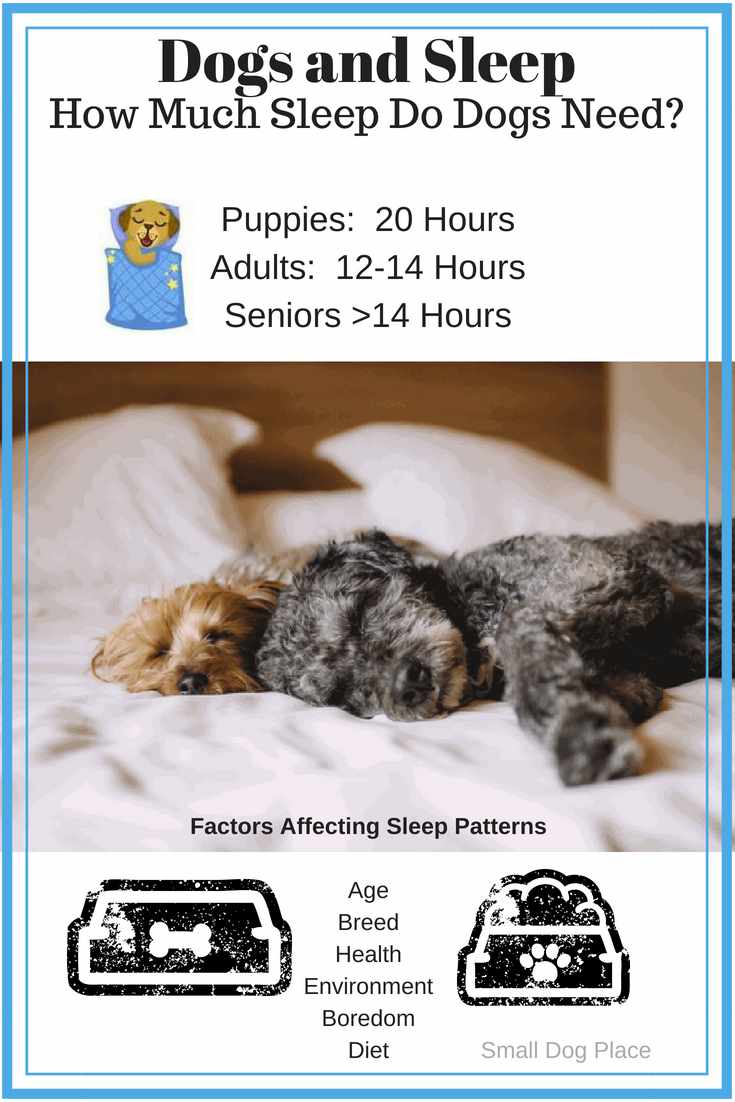
Dogs and Sleep: Pleasant Dreams?
There is good reason to believe that dogs dream just as humans although their dreams are more about dog things. Though scientists don’t know for sure about the material in dreams, they have identified that dogs do dream.
Stanley Coren, PhD, is a professor of psychology at the University of British Columbia, is a recognized expert on dog-human relates how dogs whose pons (portion of the brain that prevents us from moving while sleeping) was removed started acting out their dreams at precisely the same time that they went into their dream cycle.
Dr. Coren suggests that you can determine when your dog begins to dream.
- Watch your dog doze off. His breathing will become regular
- After 20 minutes, the dog should be dreaming
- You will know he is dreaming because his breathing will become shallow and irregular
- You can notice muscle twitches.
- Look at your dog’s eyes and see if you can see rapid eye movements under his eye lids.
Dr. Coren is the author of numerous books about dogs and human interactions. The Modern Dog, Why Do Dogs Have Wet Noses? The Pawprints of History, How Dogs Think, How To Speak Dog, Why We Love the Dogs We Do, What Do Dogs Know? The Intelligence of Dogs, among others.
Final word About Dogs and Sleep
Like us, dogs too have a unique sleeping pattern. The only difference is that unlike us, our furry friends need a lot more sleep to stay healthy and active.
Not all dogs have the same sleep cycle since it is dependent on some factors including age, breed, diet, and level of activity. Be sure to take note of your dog’s sleep pattern.
Often, when it changes, it is an indicator that your pet is in distress and it’s time to go and see your vet. So keep an eye on her and note any changes.
Author Bio: Dogs and Sleep: How Much Sleep Do Dogs Need?
Brian Morgan is an editor over at DogBedZone.com, a website dedicated to dog lovers publishing helpful tips, product reviews, and more. Brian is kept busy with his two dogs an 11-year-old Pomeranian and 7-year-old Husky.
Does This Article Deserve Your Thumbs Up?
We always appreciate your support and encouragement. Your thumbs up means so much to us.

Free Monthly Newsletter
Sign Up for Our Free Newsletter and get our Free Gift to You.
my E-book, The Top 10 Mistakes People Make When Choosing a Dog (and how to avoid them)
If you enjoyed this page, I’d love it if you’d let me know. Just click the button below. Thank you.
Sharing is Caring




